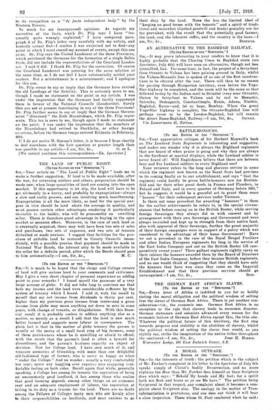(To THE EDITOR OF THE "SPECTATOR."]
t,—It is much to be hoped that the clergy and College owners of land will give serious heed to your comments and criticisms. May I give a very short chapter of personal experience as adding point to your remarks ? I found myself the possessor of a very large acreage of glebe. It did not take long to convince me that both my income and the land were considerable sufferers by the system of tenancy which I found. I sold it, with the result to myself that my net income from dividends is thirty per cent. higher than my previous gross income from rents—and a gross income from glebe may mean anything net down to zero in some years, with change of tenants, or dilapidations. With this finan- cial result it is probably useless to adduce anything else as a motive, so merely as a result I add that the land is now much better farmed and supports more labour in consequence. The plain fact is that in the matter of glebe tenancy the parson is usually at the mercy of a small local ring of big farmers, some of them parishioners whom he is unwilling or afraid to offend, with the result that the parson's land is often a byword for slovenliness, and the parson's business capacity an object of derision. Now for College land. I have seen much of it, and treasure memories of friendship with more than one delightful old-fashioned type of farmer, who is never so happy as when " under the College." And no wonder : usually a very comfortably low rent; never any haggling over repairs; nice easygoing com- fortable feeling on both sides. Result again that while, generally speaking, a College has among its tenants the reputation of being an uncommonly good landlord, it has among those who realize that good farming depends among other things on an economic rent and an adequate employment of labour, the reputation of failing in its duty as a trustee for the land. There are no doubt among the Fellows of Colleges many men who are keenly alive to their responsibilities as landlords, and most anxious to do
their duty by the land. None the less the limited ideal of "keeping on good terms with the tenants" and a spirit of tradi- tional and somewhat slipshod goodwill and feudal geniality are far too prevalent, with the result that the potentially good farmer, the land, and the labourer suffer, and the country is the loser.—I


































 Previous page
Previous page